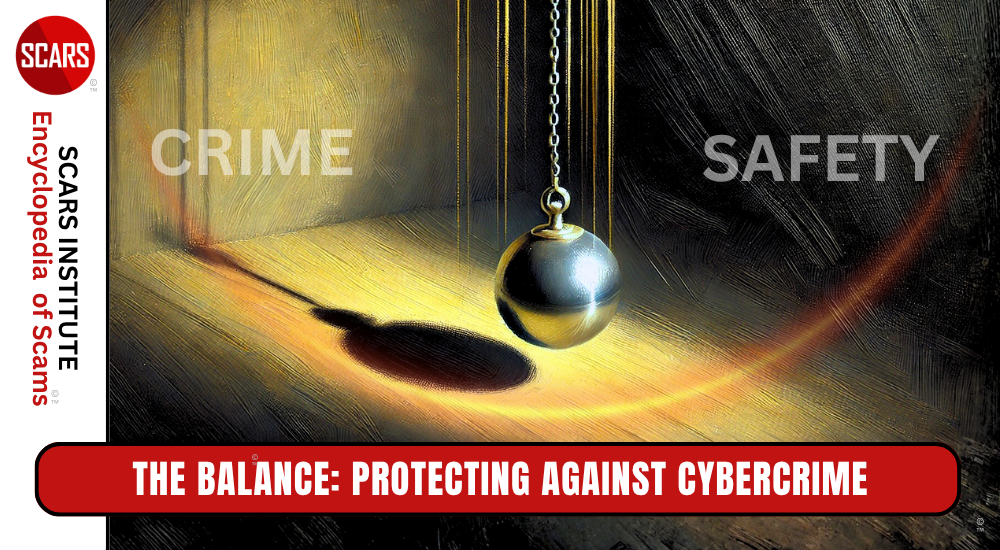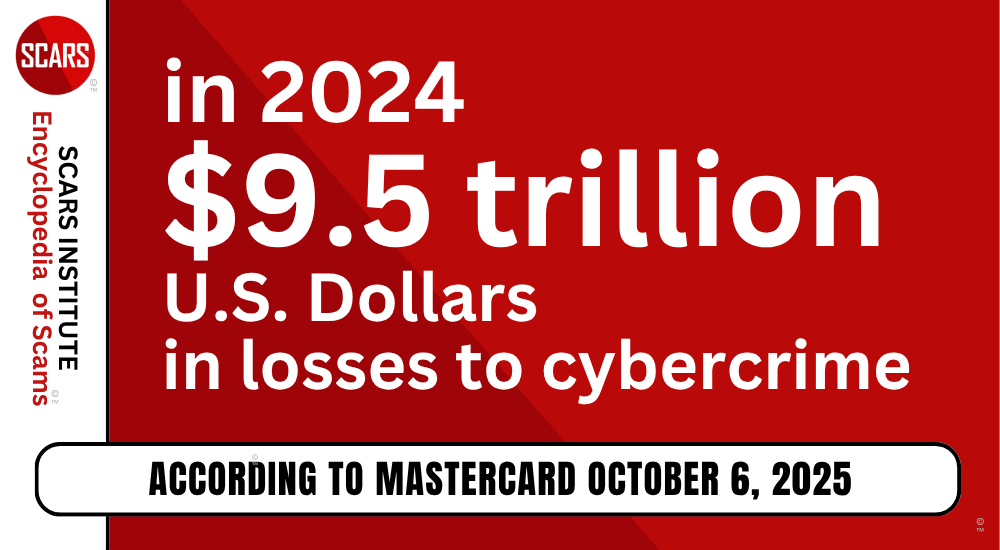
SCARS Institute’s Encyclopedia of Scams™ Published Continuously for 25 Years

2020 Scams Hit New Records – Millions More Victims
New Data Shows 2020 Was a Pandemic In Scams
A SCARS Special Report
2020 Was The Year Scams Exploded Everywhere!
Of Course, It Was Because Of The Pandemic!
People are isolated. Shut-in and alone. Limited casual interaction. All of these are a breeding ground for scammer opportunities. And scammers were ready to capitalize on it.
Some reports from Nigeria indicate that the outflow of foreign currency was the greatest of any year in history! Planeloads of cash leaving the country for other countries in Africa, Asia, and Latin America. North Korea, Iran, the Middle East, and everywhere else have large populations of operating scammers!
However, the problem of getting real hard data is that so few victims ever report these crimes. There are now strong indicators that less than 1% of the victims in 2020 have reported these crimes. It is especially bad with people under the age of 40 who cannot be bothers to report these crimes to their police. The result is they are wilfully supporting these criminals through their omission.
According to many sources, 2020 was a record year!
- Brazilian media reports that there were 5 million WhatsApp scams in Brazil alone
- Multiple sources report that scams in the United States rose to 30 million new victims in just one year – up from an estimated 1 million in 2019 – a 3,000% increase
- Cybersecurity industry data reports that all cybercrime came in at nearly US$ trillion dollars for 2020 – a realistic number in the ballpark of most credible entity data
- Even law enforcement reported record numbers of victims reporting, but still, it is a tiny fraction of the total scam victims
- People ages 40 to 69 were once again the most likely to report losing money to romance scams
- Losses to romance scams reached a record $304 million, up about 50% from 2019 – but we believe this to be 1% of the real numbers
- Even the FTC admits that scam losses increased by 4,000% in one year!
- People age 70 and older reported the highest individual median losses at $9,475.80 per victim
- Use of gift cards as a payment mechanism increased by 70% per the FTC
- Millennials continue to be the most scammed age group – they are scammed almost 20 times more than adults over 35
- Worldwide it is estimated that there were over 50 million new scam victims – but this number may be just half of what it really is
- The FBI’s Internet Crime Complaint Center has information from 791,790 complaints of suspected internet crime in 2020 — an increase of more than 300,000 complaints from 2019—and reported losses exceeding $4.2 billion. Assume this is 5% of the total – then that would be over 15 million new victims and over $85 billion dollars in losses. But 5% may be generous, it may be closer to 1% and that would be 75 million victims and $420 billion in losses which is probably closer to reality!
For Example:
Here is an article from the FTC this year about Romance Scams
Romance scams take record dollars in 2020
They say love hurts. With romance scams that’s doubly true – hearts are broken and wallets are emptied. For three years running, people have reported losing more money on romance scams than on any other fraud type identified in Sentinel.1 In 2020, reported losses to romance scams reached a record $304 million, up about 50% from 2019. For an individual, that meant a median dollar loss of $2,500. From 2016 to 2020, reported total dollar losses increased more than fourfold, and the number of reports nearly tripled.
It is reasonable to wonder: what happened in 2020 to make these dollars losses continue to spike? An obvious reason may be the pandemic limiting our ability to meet in person. But outside the pandemic, the share of people who have ever used an online dating site or app has also been rising. And romance scammers are primed to take advantage. Scammers fabricate attractive online profiles to draw people in, often lifting pictures from the web and using made up names. Some go a step further and assume the identities of real people. Once they make online contact, they make up reasons not to meet in person. The pandemic has both made that easier and inspired new twists to their stories, with many people reporting that their so-called suitor claimed to be unable to travel because of the pandemic. Some scammers have reportedly even canceled first date plans due to a supposed positive COVID-19 test.
While many people report losing money on romance scams that start on dating apps, even more say they were targeted on social media. These social media users aren’t always looking for love, and report that the scam often starts with an unexpected friend request or message.
Sooner or later, these scammers always ask for money. They might say it’s for a phone card to keep chatting. Or they might claim it’s for a medical emergency, with COVID-19 often sprinkled into their tales of woe. The stories are endless, and can create a sense of urgency that pushes people to send money over and over again.
What many of the largest reported dollar losses have in common is that people believe their new partner has actually sent them a large sum of money. Scammers claim to have sent money for a cooked-up reason, and then have a detailed story about why the money needs to be sent back to them or on to someone else. People think they’re helping someone they care about, but they may actually be laundering stolen funds. In fact, many reported that the money they received and forwarded on turned out to be stolen unemployment benefits.
In 2020, reports of gift cards being used to send money to romance scammers increased by nearly 70%. Gift cards, along with wire transfers, are the most frequently reported payment methods for romance scams.5 People said they mailed the gift cards or gave the card’s PIN number to the scammer. The median amount people sent romance scammers in 2020 using any method of payment was $2,500, more than ten times the median loss across all other fraud types.6
Reports of money lost on romance scams increased for every age group in 2020. People ages 20 to 29 saw the most striking increase, with the number of reports more than doubling since 2019. People ages 40 to 69 were once again the most likely to report losing money to romance scams. And people 70 and older reported the highest individual median losses at $9,475.8
So how can you play it safe while looking for love online? Here are some tips to help you steer clear of scammers:
- Never send money or gifts to someone you haven’t met in person – even if they send you money first.
- Talk to someone you trust about this new love interest. It can be easy to miss things that don’t add up. So pay attention if your friends or family are concerned.
- Take it slowly. Ask questions and look for inconsistent answers.
- Try a reverse-image search of the profile pictures. If they’re associated with another name or with details that don’t match up, it’s a scam.
This is all well and good, but the government really does not know how to address this increasing plague, and the current administration has canceled presidential orders that applied to consumer protections from scams and are less focused now on these crimes. The current focus is more oriented towards federal computer systems and infrastructure – all worthy areas, but the public matters just as much. In fact, it took a massive lobbying effort by 1,700 nonprofits (including SCARS) to get congress to restore major cuts in victim assistance funding – fortunately, the VOCAfix campaign worked and the funding was restored.
Two Steps Forward
However, there is also good news!
It appears that the trend is slowing and the number of new victims in 2021 will be less. Maybe by as much as half!
In addition, scammer arrests are continuing to increase – except for the pandemic year 2020. For example:
- In 2019 there were more than 111,000 scammers arrested worldwide (most in China). South Korea arrested over 9,000 scammers in 2019
- In 2020 almost 80,000 scammers were arrested worldwide (12,000 in South Korea alone and over 30,000 in China) – this was due to the pandemic
- 2021 looks like it will be a new record year for scammer arrests. In China alone, some reports indicate that over 230,000 scammers have been arrested (we believe this had to do with their pivot to COVID related scams that allowed for zero tolerance – in fact, a major portion in the increase of scams were for COVID related scams, however, all other types of scams increased as well
- Even Nigeria looks like they will increase arrests of Nigerian scammers by more than 400% in 2021, and throughout West Africa arrests are increasing.
Our own analysis indicates that with the reopening, victims are far less isolated and dependent on internet connections, and this is reducing scam susceptibility.
Regardless of the reality, the pandemic brought with it another pandemic of scams & fraud. We are only now beginning to see the end of this tsunami of scams and it exposed how completely unprepared the public is for the management of their own online safety.
The solution though is not complicated – it is education. But you play a huge role in solving this.
You Need To:
- Report every scam with money losses to your local police and all scams on www.IC3.gov and ReportFraud.FTC.gov and www.Anyscam.com
- Tell everyone you know about scams – your family and friends – make them understand that everyone can be scammed – your silence supports the criminals!
- Learn all you can about the scams so that you can be a resource for family and friends – this is the right website for that!
- Make time to talk with your local police – help them understand what it means to be a victim! SCARS offers a free guide for Law Enforcement on our main website AgainstScams.org with we will also have available in booklet form this month from our SCARS Store. Any citizens can talk to the local police chief, police commission, and city or country government about these issues!
- Take the time to talk about scams at your local PTA (school) to help parents and children understand what is going on – you can refer them to us for deeper information – but your insights matter!
- Call your local news media when there is scam news – make sure they are covering these stories
- And always remember that elections have consequences. When anti-law and order candidates are elected crime increases. Think about that for the next congressional and presidential elections. While the pandemic was a special case, we are now in 2021 and things are not better! Cybercrime law enforcement matters!
Remember, preventing crime takes more than just thinking about it. You have to act!
We are acting! Will you help as well?
2020 United States Federal Bureau of Investigation IC3 Report
[pdf-embedder url=”https://romancescamsnow.com/wp-content/uploads/2021/03/2020_IC3Report.pdf”]
-/ 30 /-
What do you think about this?
Please share your thoughts in a comment below!
LEAVE A COMMENT?
Recent Comments
On Other Articles
- Arwyn Lautenschlager on Love Bombing And How Romance Scam Victims Are Forced To Feel: “I was love bombed to the point that I would do just about anything for the scammer(s). I was told…” Feb 11, 14:24
- on Dani Daniels (Kira Lee Orsag): Another Scammer’s Favorite: “You provide a valuable service! I wish more people knew about it!” Feb 10, 15:05
- on Danielle Delaunay/Danielle Genevieve – Stolen Identity/Stolen Photos – Impersonation Victim UPDATED 2024: “We highly recommend that you simply turn away form the scam and scammers, and focus on the development of a…” Feb 4, 19:47
- on The Art Of Deception: The Fundamental Principals Of Successful Deceptions – 2024: “I experienced many of the deceptive tactics that romance scammers use. I was told various stories of hardship and why…” Feb 4, 15:27
- on Danielle Delaunay/Danielle Genevieve – Stolen Identity/Stolen Photos – Impersonation Victim UPDATED 2024: “Yes, I’m in that exact situation also. “Danielle” has seriously scammed me for 3 years now. “She” (he) doesn’t know…” Feb 4, 14:58
- on An Essay on Justice and Money Recovery – 2026: “you are so right I accidentally clicked on online justice I signed an agreement for 12k upfront but cd only…” Feb 3, 08:16
- on The SCARS Institute Top 50 Celebrity Impersonation Scams – 2025: “Quora has had visits from scammers pretending to be Keanu Reeves and Paul McCartney in 2025 and 2026.” Jan 27, 17:45
- on Scam Victims Should Limit Their Exposure To Scam News & Scammer Photos: “I used to look at scammers photos all the time; however, I don’t feel the need to do it anymore.…” Jan 26, 23:19
- on After A Scam, No One Can Tell You How You Will React: “This article was very informative, my scams happened 5 years ago; however, l do remember several of those emotions and/or…” Jan 23, 17:17
- on Situational Awareness and How Trauma Makes Scam Victims Less Safe – 2024: “I need to be more observant and I am practicing situational awareness. I’m saving this article to remind me of…” Jan 21, 22:55
ARTICLE META
Important Information for New Scam Victims
- Please visit www.ScamVictimsSupport.org – a SCARS Website for New Scam Victims & Sextortion Victims
- Enroll in FREE SCARS Scam Survivor’s School now at www.SCARSeducation.org
- Please visit www.ScamPsychology.org – to more fully understand the psychological concepts involved in scams and scam victim recovery
If you are looking for local trauma counselors please visit counseling.AgainstScams.org or join SCARS for our counseling/therapy benefit: membership.AgainstScams.org
If you need to speak with someone now, you can dial 988 or find phone numbers for crisis hotlines all around the world here: www.opencounseling.com/suicide-hotlines
A Note About Labeling!
We often use the term ‘scam victim’ in our articles, but this is a convenience to help those searching for information in search engines like Google. It is just a convenience and has no deeper meaning. If you have come through such an experience, YOU are a Survivor! It was not your fault. You are not alone! Axios!
A Question of Trust
At the SCARS Institute, we invite you to do your own research on the topics we speak about and publish, Our team investigates the subject being discussed, especially when it comes to understanding the scam victims-survivors experience. You can do Google searches but in many cases, you will have to wade through scientific papers and studies. However, remember that biases and perspectives matter and influence the outcome. Regardless, we encourage you to explore these topics as thoroughly as you can for your own awareness.
Statement About Victim Blaming
SCARS Institute articles examine different aspects of the scam victim experience, as well as those who may have been secondary victims. This work focuses on understanding victimization through the science of victimology, including common psychological and behavioral responses. The purpose is to help victims and survivors understand why these crimes occurred, reduce shame and self-blame, strengthen recovery programs and victim opportunities, and lower the risk of future victimization.
At times, these discussions may sound uncomfortable, overwhelming, or may be mistaken for blame. They are not. Scam victims are never blamed. Our goal is to explain the mechanisms of deception and the human responses that scammers exploit, and the processes that occur after the scam ends, so victims can better understand what happened to them and why it felt convincing at the time, and what the path looks like going forward.
Articles that address the psychology, neurology, physiology, and other characteristics of scams and the victim experience recognize that all people share cognitive and emotional traits that can be manipulated under the right conditions. These characteristics are not flaws. They are normal human functions that criminals deliberately exploit. Victims typically have little awareness of these mechanisms while a scam is unfolding and a very limited ability to control them. Awareness often comes only after the harm has occurred.
By explaining these processes, these articles help victims make sense of their experiences, understand common post-scam reactions, and identify ways to protect themselves moving forward. This knowledge supports recovery by replacing confusion and self-blame with clarity, context, and self-compassion.
Additional educational material on these topics is available at ScamPsychology.org – ScamsNOW.com and other SCARS Institute websites.
Psychology Disclaimer:
All articles about psychology and the human brain on this website are for information & education only
The information provided in this article is intended for educational and self-help purposes only and should not be construed as a substitute for professional therapy or counseling.
While any self-help techniques outlined herein may be beneficial for scam victims seeking to recover from their experience and move towards recovery, it is important to consult with a qualified mental health professional before initiating any course of action. Each individual’s experience and needs are unique, and what works for one person may not be suitable for another.
Additionally, any approach may not be appropriate for individuals with certain pre-existing mental health conditions or trauma histories. It is advisable to seek guidance from a licensed therapist or counselor who can provide personalized support, guidance, and treatment tailored to your specific needs.
If you are experiencing significant distress or emotional difficulties related to a scam or other traumatic event, please consult your doctor or mental health provider for appropriate care and support.
Also read our SCARS Institute Statement about Professional Care for Scam Victims – click here to go to our ScamsNOW.com website.
















Thank you for your comment. You may receive an email to follow up. We never share your data with marketers.